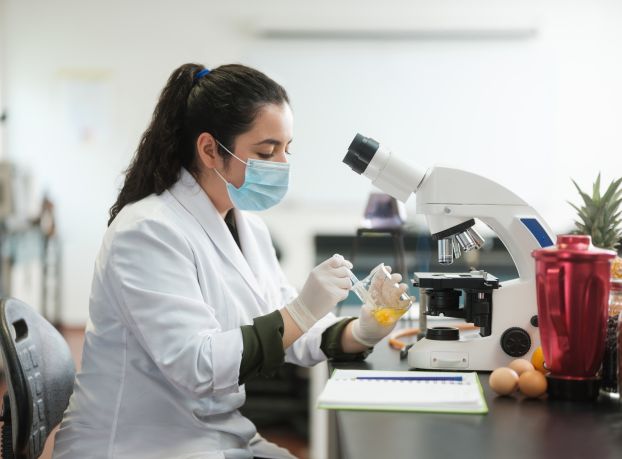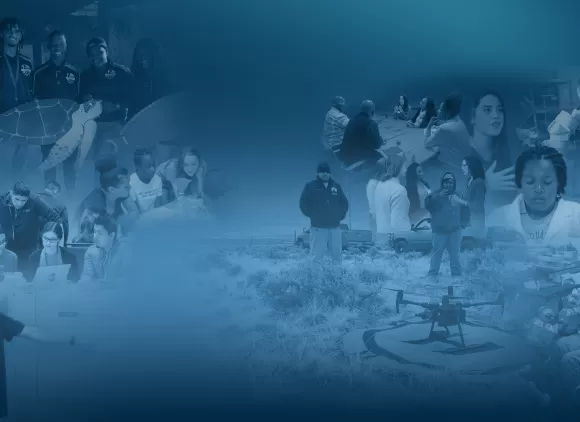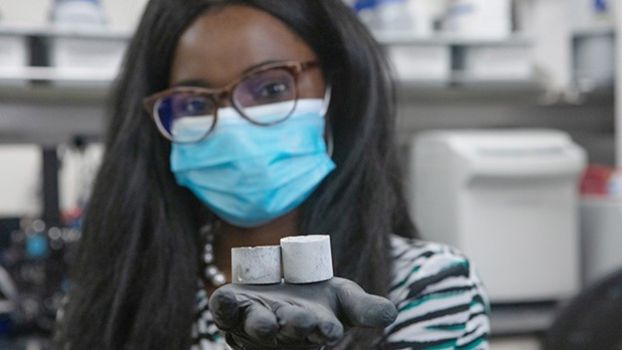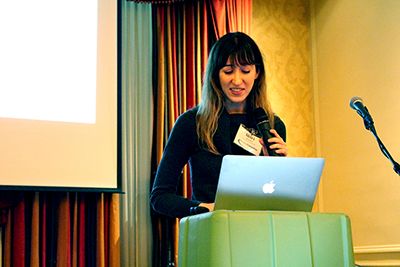Advancing gender diversity in STEM faculty
ADVANCE is NSF's premiere program focused on creating equitable, inclusive and welcoming workplaces for STEM faculty of all genders through systemic change. ADVANCE focuses on increasing the diversity of STEM faculty because they have an important role in the nation's STEM enterprise, including:
- Bringing new perspectives, ideas and research methods and approaches to STEM research.
- Helping to set and advance the STEM research agenda for the country.
- Educating and mentoring the next generation of STEM researchers and educators.
- Serving as role models in their classrooms, research labs and communities.
If you are interested in learning more about the knowledge generated by the ADVANCE program investments, consider joining the ARC Network. This will give you access to the gender equity community of experts and the curated library of resources on gender in STEM and systemic change strategies developed by ADVANCE grantees and other researchers. The ARC Network is supported by the NSF ADVANCE program.
This NSF ADVANCE Partnership project is designed to increase the participation and advancement of individuals who identify as women with disabilities in academic STEM careers. The population of women with disabilities in STEM academia is understudied and often invisible. Issues related to this population are particularly important to address because any faculty member may at some point in their career become disabled, either permanently or temporarily. Resources and tools from AccessADVANCE on practices to increase the success and advancement of women with disabilities in academic STEM careers are available on their website.
Improving STEM learning
NSF's Directorate for STEM Education (EDU) supports research on STEM education to understand how to improve the quality and effectiveness of STEM learning and teaching and increase the participation of individuals that are currently underrepresented in STEM educational programs and careers. The portfolio of EDU's research programs supports basic and applied research to add to the knowledge base on learning, teaching and inclusion of all people at all age and grade levels and in all educational and workplace settings.
STEM learning and career outcomes are common factors disaggregated by gender and explored in most education research studies. Some studies also examine the intersection of gender and other social identities such as race, ethnicity and disability status.
If you are interested in what has been learned about gender and STEM, there are several centers and hubs supported by NSF to help organize and share the knowledge generated by the NSF STEM education research programs. Search for "gender" on their respective websites to find listings of the research projects, reports, publications, grants and resources within each center.

Credit: aldomurillo
Caminos a la Ciencia/Pathways to Science is designed to recruit, retain and develop Latinas in STEM disciplines. The project studies the factors that influence high-school-aged Latinas' engagement in STEM education. It integrates Latinas' culture and background into its learning experiences and features bilingual staff and communications.
View the STEM for All video about this project.
Educating girls in STEM
NSF funds programs to encourage young women to pursue STEM fields and careers. Some examples include:
- The Rural girls engaged in math and science plus technology project, which uses mixed-methods approaches to understanding how to increase rural girls' awareness of STEM and academic preparedness for STEM-related careers. It has provided over 100 female high school students from three rural counties in Mississippi exciting experiences in hands-on field work, laboratory or project-based entrepreneurship and mentorship.
- The SciGirls in the national parks: Building positive STEM identities in underserved girls in citizen science programs using gender equitable and culturally responsive practices project, which creates media-rich citizen science experiences at national parks, with a focus on girls of color and girls from rural areas. By offering culturally responsive and gender equitable experiences, the project aims to broaden girls' STEM participation, build positive STEM identities and increase their understanding of science. The project investigated how multimedia in citizen science programming in the national parks affects girls' learning outcomes, STEM identity and connection to nature.
Credit: SciGirls, PBS Kids
SciGirls is an Emmy award-winning PBS Kids television show, website and educational outreach program that draws on cutting-edge research about what engages girls in STEM learning and careers. The effort has reached over 14 million girls, educators and families, making it the most widely accessed girls' STEM program available nationally. SciGirls’ videos, interactive website and hands-on activities work together to address a singular but powerful goal: to inspire, enable and maximize STEM learning and participation for all girls, with an eye toward future STEM careers. The goal of SciGirls is to provide media and education to change how girls think about STEM and how the world sees girls.
Featured projects by discipline
Click the dropdowns to view more examples of NSF projects that support women and girls in STEM. These have been categorized by discipline.
- Transforming STEM Career Pathways: Examining a Multigenerational Mentorship Environment to Support Persistence of Women of Color Pursuing STEM Education at Community Colleges - This project aims to increase the success of women of color (Black/African American, Latina, Asian American, and Indigenous women) who are pursuing STEM education at two-year institutions. Women remain significantly underrepresented in many STEM fields and in the educational pathways that lead into those fields. This situation has been attributed to gender-based experiences that result in feelings of invisibility and isolation. Such experiences tend to be exacerbated for women who hold other marginalized identities, such as social class, citizenship, age, and race. The importance of an intersectional approach is even greater because of the COVID-19 pandemic’s impacts on women of color. Advancing STEM participation of women of color requires the creation of spaces that holistically support the complex interplay of their intersecting identities. In these “counterspaces,” women of color can develop asset-based narratives and the mindset and skills needed to thrive academically and psychologically. This project will examine the effectiveness of a culturally responsive counterspace that features multigenerational mentorship and is focused on wellbeing and thriving as means to promote the persistence of women of color in their pursuit of STEM education.
- Collaborative Research: AGEP Transformation Alliance: Bridging the PhD to Postdoc to Faculty Transitions for Women of Color in STEM - As our nation is confronted with a STEM achievement gap between URM and non-URM undergraduate and graduate students, Vanderbilt University, Fisk University, and Wake Forest University are collaborating to develop, study and refine a model to recruit, retain and advance historically underrepresented minority (URM) women from doctoral degree attainment to postdoctoral fellowship to tenured track positions in STEM. This alliance has the potential to advance a model to improve the representation of URM women in STEM faculty positions, eventually providing URM STEM role models to a STEM undergraduate and graduate students at postsecondary academic institutions. The project includes activities to transition postdoctoral fellows into faculty positions, or a postdoc-to-faculty bridge program, to provide junior faculty with mentoring and to assist junior faculty in developing strong scholarly identities.
- Digitization PEN: Critical Central and South American additions to the EPICC TCN from the oldest Invertebrate Paleontology collection in the United States - This award made to the Academy of Natural Sciences of Drexel University (ANSP) to join the Eastern Pacific Invertebrate Communities of the Cenozoic (EPICC) Thematic Collections Network (TCN) as a Partner to Existing Networks (PEN). The EPICC TCN focuses on the digitization of marine invertebrate fossils from the last 66 million years from Eastern Pacific rim localities. Collections staff will also work with ANSP's Women in Natural Sciences (WINS) program for high school girls from underserved families in Philadelphia. Two WINS students will intern as part of the ANSP EPICC team, and then will receive a scholarship to attend Drexel’s summer geoscience field camp for high school students as a capstone experience.
- NSF Postdoctoral Fellowship in Biology FY 2020: A mechanistic approach to how the interaction of ecology and evolution determine the response of communities to temperature - Recent scientific progress in genetics, evolutionary biology, ecology, and mathematical modelling makes possible a comprehensive approach to understanding how organisms respond to temperature increase. Just as this research takes a broad approach to address the effects of temperature on biological systems, it is necessary to take a broad approach to increase diversity in the field of biology. The fellow will focus this effort on increasing the participation of women of color, who are underrepresented in science… These actions include developing a module for use in the classroom to allow students to investigate the effect of temperature on biological communities. Furthermore, the fellow will develop a web-based international women’s mentoring chain, connecting scientists in Ecology and Evolution from seniors in high school to university professors.
- BII-Design: Using Synthetic Biology to Discover Cross-Kingdom Metabolic Rules of Life - Despite its intellectual power and practical potential in metabolic engineering, SynBio has been slow to reach plant biology and SynBio training has historically been concentrated in engineering schools where women and other groups are notably underrepresented. There is consequently an urgent need to bring SynBio into mainstream plant metabolism research and diversified training, and to use SynBio’s build-to-learn philosophy to define Rules for redesigning plant metabolism. This project will accordingly harness the complementary SynBio strengths of three leading plant science universities to design a tri-campus PhD training and research program to define Rules to guide engineering of novel metabolic pathways. The project will be designed in virtual workshops, one hosted by each campus. Design goals will be to (i) integrate basic engineering skills and internships in SynBio companies into PhD training, leading to an interuniversity graduate research certificate, and (ii) develop strategies to recruit women to redress the gender imbalance in engineering. The workshops will also help plan a major 2021 Plant SynBio Conference, which Co-PI Lenaghan will chair.
- NSF Postdoctoral Fellowship in Biology: Investigating the spatiotemporal coordination of cell and chloroplast division - This award funds an NSF Postdoctoral Research Fellowship in Biology for FY 2022, Broadening Participation of Groups Underrepresented in Biology. The Fellowship supports a research and training plan for the Fellow that will increase the participation of groups underrepresented in biology. In this project, the Fellow will investigate intracellular communication and the coordination of key cellular processes in photosynthetic organisms. During photosynthesis, land plants and algae use specialized cell structures called chloroplasts to capture light energy and convert carbon dioxide into oxygen and sugars. The Fellow has designed a broader impacts program that will increase the participation of groups underrepresented in biology by developing a cross-institutional mentoring and support program for Black female postdoctoral fellows in biology in the Research Triangle.
- CNS Core: EAGER: Building Leadership Capacity and Support for Women of Color Faculty - The project will occur in three phases in each of the two years. The first phase of this project focuses on helping women of color, computing and engineering faculty understand who they are as potential leaders, via a set of leadership development assessments. The second phase brings these women together with senior colleagues and certified facilitators to learn about leadership strategies and tools; to assist participants in interpreting the results of their individual assessments; to develop a personal, leadership development plan; to facilitate discussion on case studies related to leadership and management; and to describe the role race and gender play for women in leadership positions and organizational advancement. The third phase builds a strategic alliance across a subset of historically underrepresented and often overlooked members of the computing and engineering professoriate to encourage and support their advancement into STEM leadership positions. Upon completion of this project there will be a cadre of women of color leaders equipped and prepared to step into academic leadership positions (i.e. Department Chair/Head, Dean, Provost, President) or a senior research/technical leadership role (i.e. Director of an Institute or Research Center). Additionally, the project will have created a network of mid- and- senior women of color who can provide support to one another as they advance through higher education’s administrative ranks.
- Women of Color in Tech - The National Academies of Sciences, Engineering, and Medicine is convening a series of regional workshops, prepared by the Policy and Global Affairs Division's U.S. Science and Innovation Policy unit, aimed at engaging the national community in identifying effective, evidence-based strategies for increasing the participation, retention, and advancement of women of color in tech fields. These fields include computer science, computer and information science and support services, information technology, and engineering. The goals of these workshops are to: 1) Identify constructive and sustainable solutions for colleges and universities, businesses, and government agencies by collecting and synthesizing evidence on effective programs, practices, and models that take an intersectional approach to recruiting, retaining, and significantly increasing the participation of women of color in tech degree programs and careers. 2) Build a community of practice devoted to addressing this important national issue, and create research-practitioner partnerships to drive the implementation and evaluation of evidence-based strategies and programs for improving the participation of women of color in tech.
- Computing and Intersectionality (The Social and Behavioral Structures at Play for Black Women in the Computing Sciences): An Inclusive Agenda for Computing -The underrepresentation of women of color is more acute than the underrepresentation of women generally and the factors that contribute to that warrant exploration. The goal of the project is to establish a standing national conference that directly addresses issues associated with women of color within the computing sciences. It is a standing meeting to explore the particular dynamics of their experiences and to assess and determine effective institutional strategies to overcome the current challenges. Concurrent with the establishment of a standing meeting, Computing and Intersectionality will develop a journal of scholarly research for both social scientists and computer scientists, to focus on the intersectional factors that affect women of color.
- CAREER: An Asset-based Longitudinal and Intersectional Analysis of Black Women’s Experiences within Informal and Formal Engineering Education - This project will consist of the development of a longitudinal database with profiles of Black women who have completed engineering degrees and participated within an informal engineering program, the Summer Engineering Experience for Kids (SEEK) program, hosted by the National Society of Black Engineers (NSBE), and other experiences related to their educational journey. In collaboration with NSBE, a three phased approach will be conducted: Phase I: development of a database with participant profiles using longitudinal demographic and survey data results, Phase II: qualitative interviews will be conducted with results added to participant profiles, and Phase III: data from previous phases will be examined and validated through the support and guidance of external experts. Using intersectionality, social and cultural capital, and anti-deficit achievement as theoretical frameworks, the following research questions will be answered: (RQ1) To what extent does participation within informal and formal engineering education develop over time to impact Black women’s formation as engineers towards degree completion? (RQ2) How do individual, institutional, and cultural factors within the interchange of informal and formal engineering education contribute to Black women’s formation as engineers and persistence in engineering degree programs?
- Understanding the Role of Affinity Groups on the Advancement of Women of Color in the Engineering Academy a Workshop - It is well known and well documented that there are disparities, challenges, roadblocks and opportunities for Women of Color (WoC) engineering academics. In the academy, it is known that advancement is not solely driven by scholarly work, but by connections, awareness, social networks and resilience. However, the absence of these and cultures of inclusion can cause isolation within the faculty. Affinity groups could be utilized as vehicles for improving the advancement of WoC in the academy. Affinity groups are employee or professional communities with a common social identity that are formed with the goal of supporting and developing its members for successful careers. The purpose of the workshop is to discover the reach, structure, and impact of affinity groups, and to learn from successful models from other professional societies.
- SBE-UKRI: Collaborative Research: Centering Women of Color in STEM: Data-Driven Opportunities for Inclusion - This project will support institutions concerned with addressing this underrepresentation by creating a portal through which US and UK STEM departments can measure their success at graduating women (especially women of color) to that of comparable institutions and to their own prior performance. The portal will make use of sophisticated visualization tools and will be accessible and user-friendly.
- EAGER: Celebrating the successes and identifying the obstacles faced by innovative and entrepreneurial underrepresented women of color - This EAGER award conducts exploratory research on the successes and obstacles faced by innovative and entrepreneurial women of color in STEM (science, technology, engineering, mathematics). Situated within the intersectionality framework, this research will be conducted via in-depth interviews and focus groups with Underrepresented Women of Color (URWOC) innovators and entrepreneurs. This research defines Women of Color as those women who identify as African-American/Black, Latinx/Hispanic/Chicana, and Indigenous/Native Alaskan/ Native Hawaiian to better understand: (1) the background of URWOC founders and how they became interested in starting a STEM venture; 2) the strategies that URWOC owner/founders employed to start and persist in their ventures/innovations, choose to license, or sell their ventures/innovations; 3) similarities and differences in intersectionality across URWOC groups who are engaged in STEM innovation and entrepreneurship (I&E); 4) the unique experiences and challenges that URWOC endure in their I&E endeavors and 5) how to increase the number of URWOC in I&E with a focus on providing assistance to national initiatives aimed at diversifying underrepresented groups in I&E.
Contact Information
For further information concerning NSF's Broadening Participation programs, please contact:
Dr. Alicia J. Knoedler
NSF Executive Liaison for Broadening Participation in STEM
U.S. National Science Foundation
Phone: 703-292-8040
Email: broadpart@nsf.gov





